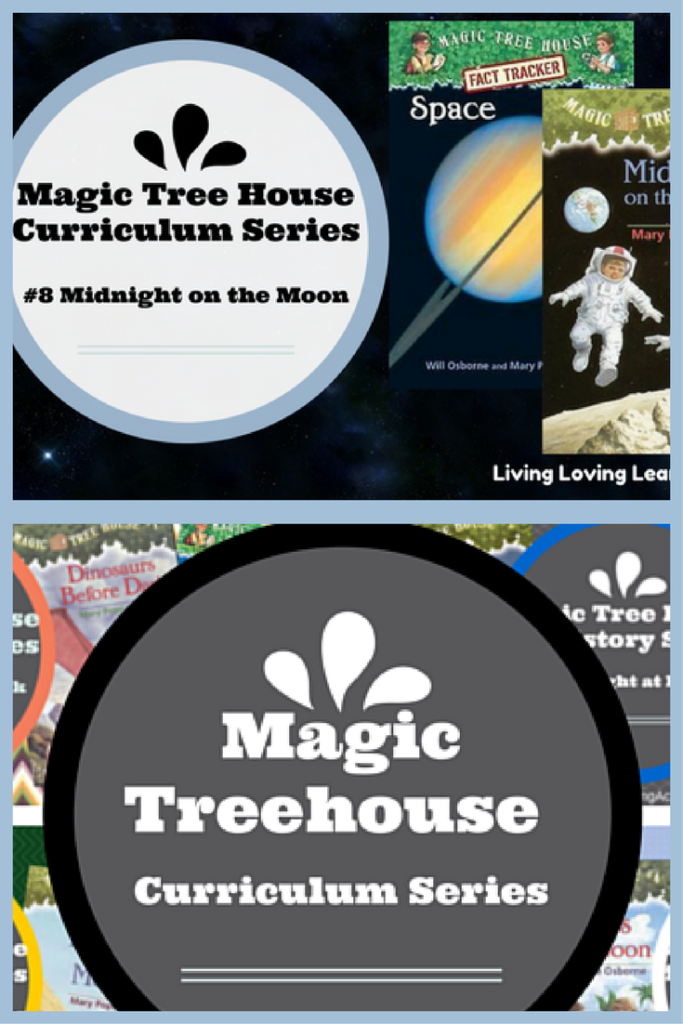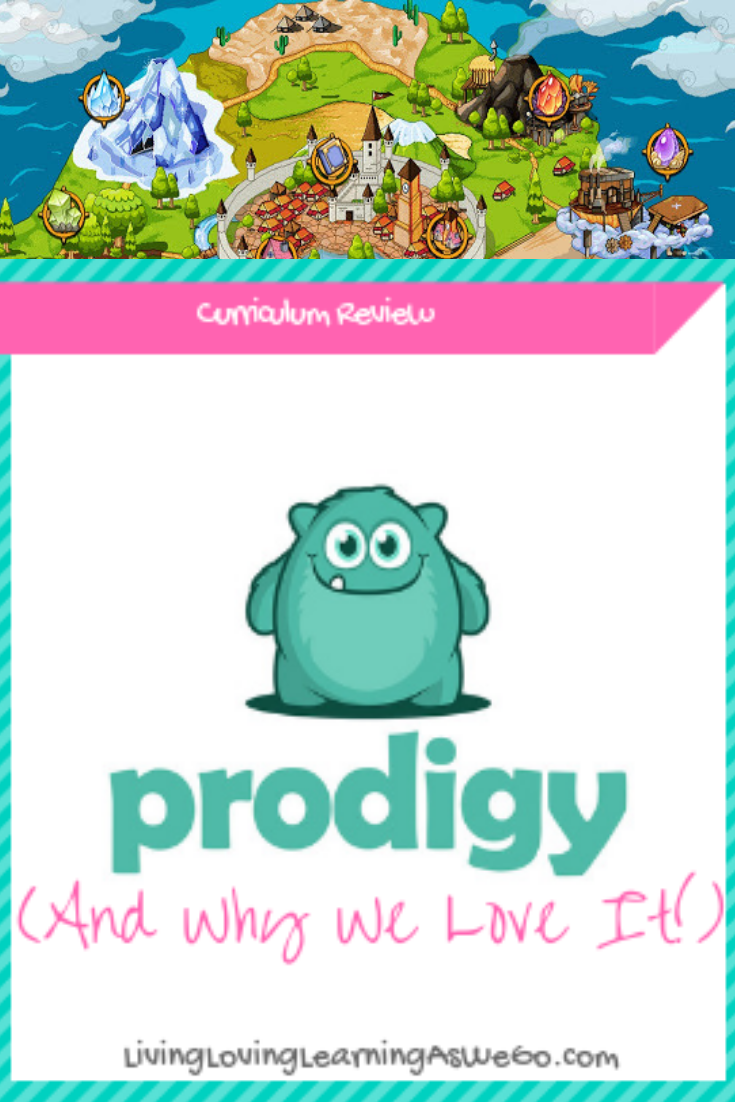(Disclaimer- This post may contain affiliate links. For more information, please see Disclosure Policy.)
Supplies:
- Magic Tree House Book Midnight on the Moon and Magic Tree House Research Guide: Space – A Nonfiction Companion to Midnight on the Moon [I try to get books from the library whenever possible, but they don’t always have everything.]
- Backpack Journals for Book 8 (Click on the book and download the Backpack Study-Books 5-8. Print 1 Story Mapping with Annie page, and 1 Jack’s Facts page.) You can fill in facts you want to write down on Jack’s Facts page as you come across them in the reading.
- Optional: Magic Tree House Games and Puzzles from the Treehouse book [This gets used a lot, but I will try to find alternatives online when possible. I make copies of the pages for easy gluing into the notebook]
- The spiral or composition notebook started with book 1
- Free account at Magic Tree House
- The usual: paper, printer, ink, pencils, crayons or colored pencils
- Other supplies will depend on what additional projects you choose to do: Build your own telescope; Moon Phases Oreos
[This unit covers more science than history and is longer than the ones done previously. We focused on space for 6 weeks.]
Day 1

- Read chapter 1 Research Guide: Space- Astronomy [For a cover page for this section, I made a copy of the cover of the MTH Space book]; or you could use the Solar System Coloring Page from 123Homeschool4Me pack [I printed all]
- Watch Magic School Bus- Gets Lost in Space (Solar System) [available on Netflix at time of posting]
Day 2
- Using the Astronomy Dictionary, write the following words and read the definitions aloud:
- Apollo
- asteroid
- astronaut
- astronomy
- atmosphere
- Astronomical Unit
- axis
- black hole
- comet
- constellation
- (Don’t worry if many of these words seem advanced for your child’s age/grade level. This is just an introduction to some of those more difficult concepts.)
- Watch Popular Mechanics for Kids: Spaceships (S1Ep17)** [available on YouTube** or Amazon Prime]
Day 3
- Read prologue and chapters 1-2 of Midnight on the Moon
- After each chapter, use the story map to summarize the main event in the chapter [We followed up the reading with a short discussion about real and pretend; specifically that time travel is what is called science-fiction and magic is pretend.]
- On story map, draw the setting of where they said they wanted to go (picture in book Jack and Annie were looking at) and the the Mission Key
- Read over yesterday’s words; Write the following 10 words in notebook and read definitions aloud
- day
- eclipse
- flares
- galaxy
- geocentric
- light year
- mass
- meteor
- meteorite
- meteoroids
- Watch Crash Course Kids: Spaced Out**
Day 4
- Read chapters 3-4
- Story map after each chapter
- I Spy on the Moon (Pg.36 MTH Games and Puzzles)
- Watch video The Importance of Spacesuits
- Read over yesterday’s words; Write the following 10 words in notebook and read definitions aloud
- Milky Way
- nebula
- nova
- orbit
- phases
- planet
- revolve
- rotate
- satellite
- shooting star
Day 5
- Read chapters 5-6
- Story map after each chapter
- Maze (Pg.37 MTH Games and Puzzles); Alternative: Space Mazes
- Read about the first manned moon landing. What did they place on the moon’s surface? What did they collect?
- Read over yesterday’s words; Write the following 5 words in notebook and read definitions aloud
- solar system
- stratosphere
- star
- supernova
- troposphere
Day 6
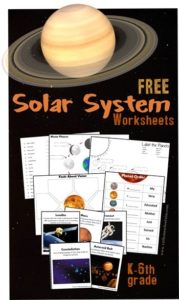
- Read chapters 7-8
- Story map after each chapter
- Connect-the-Stars (Pg.39 MTH Games and Puzzles); Or print this Constellation Map Dot-to-Dot
- Watch Crash Course Kids: Star Personalities**
- Do you know any constellations? Try to find one in the sky before bed. You can print a sky map for your hemisphere to help you, if you would like.
- Add Constellations card to notebook (from 123Homeschool4Me Solar System Worksheets) [I only printed the pages with the cards; pages 3-7]
Day 7
- Read chapters 9-10
- Storymap after each chapter
- Fill in clue #4 on the Travel Journals Page.
- Take the Midnight on the Moon Passport Quiz (Don’t forget to log in!)
- In chapter 1 of the Research Guide: Space, we read a little about 4 early astronomers: Ptolemy, Copernicus, Galileo, and Newton. Write the names of each and what they believed or discovered:
- Ptolemy- believed Earth was the center of everything
- Copernicus- believed the Earth and other planets traveled around the sun
- Galileo- believed Copernicus and built his own version of a telescope to study the sky and try to prove Copernicus’ theory
- Newton- discovered the law of gravity; believed it was gravity that kept the moon traveling around Earth
- Learn more about telescopes with a Crash Course** video (aimed for older kids, but still good information)
- Add Solar System, Astronomer and Telescope cards to notebook
- Optional: See extras below for how to build your own telescope!
Day 8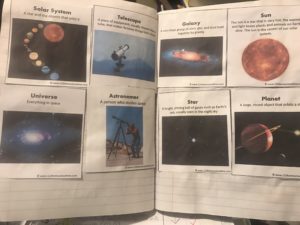
- Read chapter 2 Research Guide: Space-The Universe [This chapter tells about the Big Bang. Use your judgement and personal beliefs as the basis for discussion.]
- Watch Facts About Our Solar System; what was the most astounding fact you remember?
- Add Universe and Galaxy cards to notebook
Day 9
- Read chapter 3 Research Guide: Space- The Sun
- Sun coloring page
- Read more about the sun
- Watch video The Sun
- Play a game, then when it says to choose one, select the sun
- Add Sun and Star cards to notebook
Day 10
- Read chapter 4 Research Guide: Space- Our Solar System, pages 45-53
- Watch Magic School Bus- Out of this World (Meteorites) [available on Netflix at time of posting]
- Asteroid Belt and Milky Way coloring pages while watching
- Add Planet, Meteor, Comet, and Asteroid Belt cards to notebook
Day 11
- Read a book about planets such as The Planets in Our Solar System or something similar from your home or local library
- Listen to Planets Song
- Add Planets Mini-book to notebook [I only printed the pages with the mini-book from the pack.]
Day 12

- Read chapter 4 Research Guide: Space, pages 54-55
- Mercury coloring page
- Watch video about Mercury**
- Mercury Notebook page (from Blessed Beyond a Doubt)
- Find your age and weight on Mercury; add it to fun facts on notebook page
- Add Mercury card to notebook
Day 13
- Read chapter 4 Research Guide: Space, pages 56-57
- Venus coloring page
- Watch video about Venus**
- Venus Notebook page
- Find your age and weight on Venus; add it to fun facts on notebook page
- Add Venus card to notebook
Day 14
- Read chapter 4 Research Guide: Space, pages 58-59, 60-61
- Earth coloring page
- Watch video about Earth**
- Earth Notebook page; what does earth have that makes it unique? (the right environment for life)
- Add Earth card to notebook
Day 15
- Read chapter 4 Research Guide: Space, pages 62-63
- Mars coloring page
- Watch video about Mars**
- Learn more about the Mars Rover
- Mars Notebook page
- Find your age and weight on Mars; add it to fun facts on notebook page
- Add Mars card to notebook
Day 16
- Read chapter 4 Research Guide: Space, pages 64-65
- Jupiter coloring page
- Watch video about Jupiter**
- Jupiter Notebook page
- Find your age and weight on Jupiter; add it to fun facts on notebook page
- Add Jupiter card to notebook
Day 17
- Read chapter 4 Research Guide: Space, pages 66-67
- Saturn coloring page
- Watch video about Saturn**
;
- Saturn Notebook page
- Find your age and weight on Saturn; add it to fun facts on notebook page
- Add Saturn card to notebook
Day 18
- Read chapter 4 Research Guide: Space, pages 68-69
- Uranus coloring page
- Watch video about Uranus**
- Uranus Notebook page
- Find your age and weight on Uranus; add it to fun facts on notebook page
- Add Uranus card to notebook
Day 19
- Read chapter 4 Research Guide: Space, pages 70-71
- Neptune coloring page
- Watch video about Neptune**
- Neptune Notebook page
- Find your age and weight on Neptune; add it to fun facts on notebook page
- Add Neptune card to notebook
Day 20
- Read chapter 4 Research Guide: Space, pages 72-73 [Pluto is now considered a dwarf planet]
- Pluto coloring page
- Watch video about Pluto**
- Watch video Why isn’t Pluto a planet any more?
- Find your age and weight on Pluto
- Read pages 74-75 of Research Guide: Space to review the order of planets
- Add Dwarf Planet card to notebook
- Choose a project to make a model of the Solar System such as a mobile, play-dough, Legos, candy or food, diorama, poster, balloons, or something else you think of and get supplies ready for tomorrow
Day 21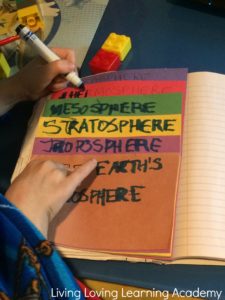
- Work on model of the Solar System
Day 22
- Read chapter 5 Research Guide: Space- Space Travel
- Read about the Layers of the Atmosphere
- Make a Layers of the Atmosphere Book
- Optional: Layers of the Atmosphere Hands-on Lab/Project
- Add Atmosphere card to notebook
- If not finished, work on model of the Solar System
Day 23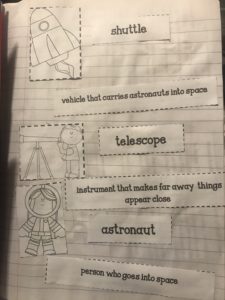
- Complete Exploring Space with an Astronaut Vocabulary Cut & Paste [Cut & paste directly into notebook; if you don’t already have a TPT account, you can sign up for one for free]
- Watch Magic School Bus-Sees Stars [available on Netflix at time of posting]
- Add Rocket and Astronaut cards to notebook
Day 24
- Read chapter 6 Research Guide: Space- From Earth to the Moon
- Play a game, then when it says to choose one, select the moon
- Watch Will We Ever Live on the Moon? video
- Find your age and weight on the moon
- Add Moon and Orbit cards to notebook
Day 25
- Watch Learning about the Moon and its phases**
- Complete Phases of the Moon Worksheet
- Optional for fun: Phases of the Moon with Oreos
- Add Moon Phases card to notebook
- Read chapter 7 Research Guide: Space- Space Travel Today
- Watch a Space Shuttle launch
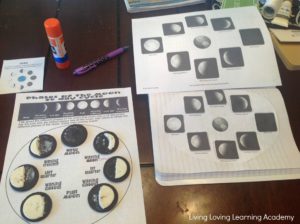
Day 26
- Read chapter 8 Research Guide: Space- Living and Working in Space
- Watch Popular Mechanics for Kids- Space Station (S3Ep20)** [also available on Amazon Prime]
Day 27
- Read chapter 9 Research Guide: Space- The Future
- Take the Research Guide: Space Passport Quiz (Don’t forget to log in!)
- Add remaining cards to notebook: Satellite and Gravity
Day 28
- Watch a movie such as Fly Me to the Moon (G)or Space Buddies (G)
- (Optional) Try “astronaut food” such ice cream; what do you think of it?
Extras:
- More Crash Course Kids Space Science videos**
- If you have a local museum with a planetarium, this would be a great place for a field trip.
- Build your own telescope!
- Apollo 11 worksheet
- Space and Astronomy coloring pages
- More Solar System coloring pages
(Updated 11/28/18)
For more activities and ideas:
(Disclaimer- This post may contain affiliate links. For more information, please see Disclosure Policy.)
**YouTube occasionally has inappropriate content. Make sure to set the safety filter at the bottom of page to on or watch with children to be able to reload page, if something objectionable comes up.
If you come across any broken links or resources no longer available, leave a comment on the Facebook page and I will get them fixed as soon as I can. Thanks!
Save
Please follow and like us:

